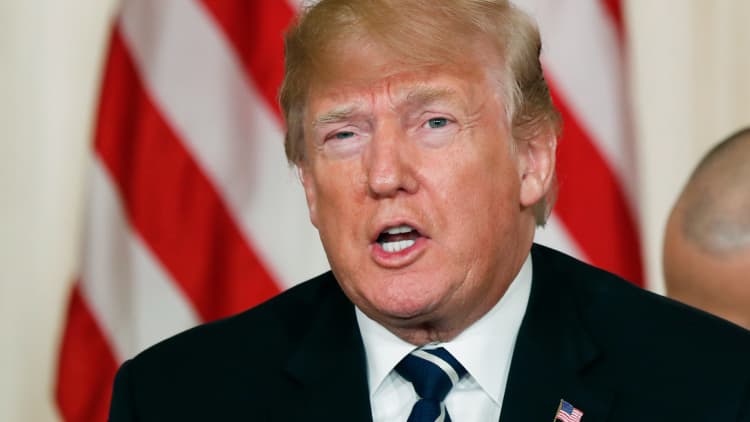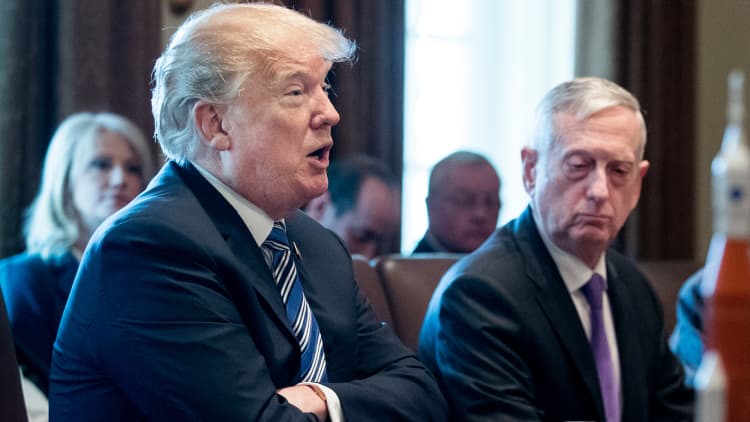
President Donald Trump announced in a tweet on Monday that he will deliver his decision on the Iran nuclear deal on Tuesday at 2 p.m. ET.
Trump faces a May 12 deadline to either continue suspending sanctions targeting Iran's oil exports or snap the penalties back into place. Refusing to grant the sanctions relief would imperil the nuclear agreement and potentially put the United States on a diplomatic collision course with some of its closest allies and trade partners.
The decision also has implications for the oil market because Iran is OPEC's third largest crude producer. Uncertainty around the deal has boosted prices in recent weeks, with U.S. crude topping $70 a barrel on Monday for the first time since November 2014.
Crude futures gave up Monday's gains after Trump teased his announcement on Twitter.
It remains to be seen whether Trump will scrap the deal on Tuesday, fulfilling a campaign pledge, or somehow kick the can down the road.
Iran-watchers have speculated that he could waive the sanctions as he gears up for nuclear talks with North Korea, putting the Iran decision off until the Korean crisis is resolved. Analysts have also floated the idea of the Trump administration restoring sanctions, but giving purchasers of Iranian oil plenty of time to comply. That would give his administration time to continue negotiating with European leaders, who want to keep the deal in place.

Under the terms of the 2015 nuclear deal negotiated by the Obama administration, the international community agreed to suspend sanctions against Iran so long as it lives up to the terms of the accord. In exchange for sanctions relief, Iran accepted limits on its nuclear program and grant access to atomic facilities to international inspectors.
Iran hammered out the deal with China, France, Germany, Russia, the U.K. and the United States.
While Iran remains in compliance, Trump has long threatened to restore sanctions anyway.
Trump refused to certify the deal to Congress last year, essentially saying the deal was no longer in the country's national security interest. In January, he waived sanctions but said he would not do so again unless his administration could reach a deal with European partners to toughen the terms of the 2015 accord.
Despite recent meetings with foreign leaders, that deal has not yet emerged. The next deadline to waive sanctions is on Saturday, May 12.
Trump and foreign policy hawks have criticized the 2015 deal because it did not address Iran's ballistic missile program, its involvement in regional conflicts or its support for U.S.-designated terrorist groups.
They also say the deal is fundamentally flawed because certain restrictions on Iran's nuclear activity expire 10 to 15 years from implementation. Trump and many Republicans want to overwrite these so-called "sunset clauses" and make the restrictions permanent.
France, Germany and the U.K. have so far drawn the line at changing the sunset clauses, though French President Emmanuel Macron has signaled a willingness to discuss a path forward after the restrictions expire.
The sanctions up for waiver on Saturday strictly target Iran's oil exports. The next deadline to suspend sanctions on Iran's broader economy does not arrive until July 11, though it is possible Trump will also address these on Tuesday afternoon.
Oil analysts say renewed sanctions on Iran's oil exports are unlikely to be as far-reaching and impactful as those imposed by the Obama administration. That is because the Obama administration solicited support for them after the world grew concerned about Iran's alleged nuclear weapons program, which Tehran denies.
The Trump administration will have to compel countries to comply at a time when foreign powers see Iran as complying with an internationally negotiated deal.
Analysts say China is unlikely to cut off Iranian oil purchases, and other big buyers like India and Turkey could push back on the sanctions. Ultimately, they expect no more than 500,000 barrels a day of Iranian oil to come off the market, compared with 1 million-1.5 million barrels under Obama.
However, the impact of the sanctions will depend on several factors. That includes whether Iran begins accelerating its nuclear program, which could boost support for sanctions, or continues to abide by the terms of the deal in a bid to isolate the Trump administration.


